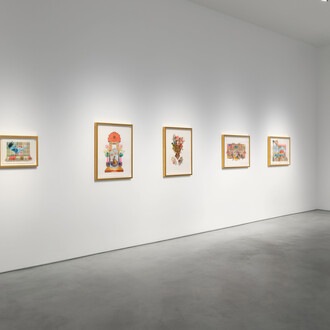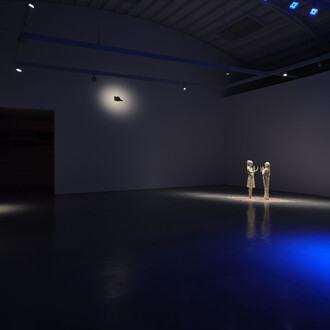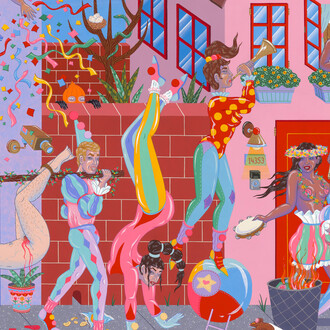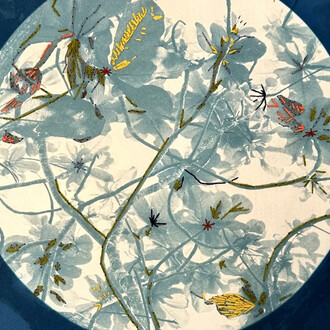In conjunction with Getty’s PST ART: Art & Science Collide initiative, Roberts Projects is honored to present Mojotech, a monumental altar assemblage by the renowned artist Betye Saar. Originally conceived in 1987 during Saar’s residency at the Massachusetts Institute of Technology (MIT), this installation serves as a profound exploration of the intersection between contemporary technology and ancient spiritual practices.
In Mojotech, Saar interrogates the presence of the metaphysical within the realm of modern technology by juxtaposing ritualistic objects, charms, and symbols with circuit boards and electronic components. This deliberate fusion draws aesthetic and conceptual parallels between the organic world and the constructed technological sphere. Invoking a participatory element, the work invites viewers to leave personal or technological offerings at the base of the altar, echoing the accumulative tradition of African sculpture, which integrates various “power” elements from diverse cultural practices.
Archival materials from Saar’s MIT residency will also be featured in the exhibition, including original photographs, slides, sketches, printed materials, and the initial communal offerings from the work’s inaugural installation. These artifacts serve to connect the original manifestation of Mojotech with its present iteration, offering a critical reflection on the evolving relationship between art, technology, and spirituality.
The exhibition will be accompanied by a catalogue to be published by Roberts Projects, featuring extensive materials from Saar’s residency at MIT and Mojotech’s installation history over the years.
In celebration of Mojotech’s 37th anniversary, Roberts Projects will hold a panel discussion on the links between gender, art and technology that have emerged since the mid-20th century. Panelists include Nancy Baker-Cahill, Sarah Rosalena and Mindy Seu, with Jori Finkel as moderator. This conversation will be open to the public with the artist herself in attendance. On view during the event will be additional artworks by Saar that demonstrate her longstanding interest in using technological components in her practice. Further details will be shared in September 2024.
Southern California’s landmark arts event, PST ART, returns in September 2024 with more than 818 artists, 50 exhibitions and 1 mind-blowing theme: Art & Science Collide. In partnership with museums and institutions across the region, this is one of the most expansive art events in the world. This “collision” will explore the intersections of Art and Science, both past and present, with diverse organizations activating exhibitions on topics like ancient cosmologies, Indigenous sci-fi, environmental justice and artificial intelligence.
Betye Saar (b. 1926) received her Bachelor of Arts from the University of California, Los Angeles in 1949, with graduate studies at California State University at Long Beach, the University of Southern California and California State University at Northridge. Saar holds 6 honorary doctorates from California Institute of the Arts; Otis College of Art & Design; California College of Arts and Crafts; San Francisco Art Institute; Massachusetts College of Art; Cornish College of the Arts; and over 37 honors including two National Endowment for the Arts (1974, 1984); Studio Museum in Harlem (1989); Los Angeles County Museum of Art (2019); Academy of Arts and Letters (2021). She has received 5 Lifetime Achievement Awards from the Congressional Black Caucus (2008); California African American Museum (2011); Edward McDowell Medal (2014); Museum of the African Diaspora (2017) and International Sculpture Center (2019).
Saar’s work is in over 80 museum collections including: The Metropolitan Museum of Art; Whitney Museum; Smithsonian National Museum of African American History and Culture; National Gallery of Art; Studio Museum in Harlem and Los Angeles County Museum of Art. In 2018, the Museum of Modern Art acquired 42 important early works, making their holdings the largest public collection of Saar’s artwork.
















